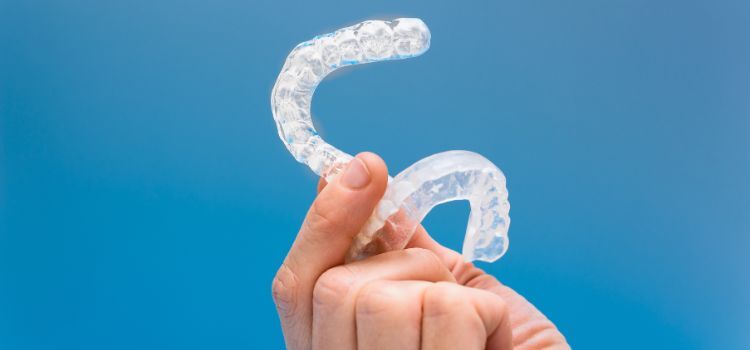Is Gerd a Risk Factor for Bruxism?
21st May 2025

If you have GERD (acid reflux) and bruxism (teeth grinding), you might be wondering if they’re connected. GERD causes stomach acid to flow back into the esophagus, sometimes reaching the mouth. Bruxism, on the other hand, is when you clench or grind your teeth, often during sleep. But can acid reflux trigger teeth grinding?
Can GERD Cause or Worsen Bruxism?

While GERD and bruxism may seem unrelated, some research suggests a possible connection. GERD can affect sleep, Studies have shown that gastroesophageal reflux disease (GERD) can lead to sleep deprivation due to nighttime heartburn or brief awakenings during sleep—which might contribute to teeth grinding.
GERD symptoms like heartburn and coughing can make it harder to sleep, and poor sleep is a known trigger for teeth grinding at night.
A review of existing studies suggests that sleep bruxism (SB) is likely caused by multiple factors. Childhood history of SB, GERD, and genetic factors appear to be important risks for developing SB in adults.
GERD can also weaken tooth enamel, making teeth more vulnerable to damage from bruxism. Even if GERD isn’t a direct cause, it might make grinding worse by increasing tooth sensitivity and wear. A study found that long-term GERD is linked to more severe tooth wear in people with bruxism.
While more research is needed, GERD could be a risk factor for bruxism or make symptoms worse.
Related Article:
- Worn Down Teeth Causes and Treatment
- Tooth Abrasion: Causes and Treatment
- Melatonin for Teeth Grinding
What Are GERD and Bruxism?
What Is GERD?
GERD (gastroesophageal reflux disease) is a condition where stomach acid flows back into the esophagus, causing discomfort and irritation. Common symptoms include heartburn (a burning sensation in the chest), acid reflux (a sour or bitter taste in the mouth), sore throat or hoarseness, difficulty swallowing, and nighttime coughing or choking.
Many people with GERD notice their symptoms worsen at night, especially when lying down. Over time, acid exposure can even reach the mouth, leading to tooth erosion, sensitivity, and irritation in the throat and jaw.
What Is Bruxism?
Bruxism is the involuntary clenching or grinding of teeth, which can happen during the day (awake bruxism) or at night (sleep bruxism). People with bruxism may experience jaw pain or tightness, worn-down or sensitive teeth, morning headaches, and disrupted sleep.
Since grinding often happens unconsciously, many people don’t realize they have bruxism until their dentist notices signs of tooth damage. The exact causes of bruxism vary, but factors like stress, anxiety, sleep disorders, and even acid reflux may play a role.
How to Manage GERD and Bruxism Together
If you experience both GERD and bruxism, managing one condition may help improve the other. Here are some simple strategies to reduce symptoms and protect your teeth.
Managing GERD
- Eat smaller meals and avoid acidic, spicy, or fatty foods that trigger reflux.
- Avoid eating before bed—give your body at least 2-3 hours to digest.
- Sleep with your head elevated to prevent acid from rising.
- Limit caffeine and alcohol, as they can relax the esophageal muscles and worsen reflux.
- Consider medication like antacids or acid reducers if recommended by a doctor.
Managing Bruxism
- Use a custom night guard to protect your teeth from grinding.
- Practice stress relief (meditation, deep breathing, or jaw relaxation exercises).
- Avoid chewing gum or biting on hard objects, which can make jaw tension worse.
- Get good sleep—stick to a consistent sleep schedule and create a relaxing bedtime routine.
- See a dentist if grinding is causing pain or damage.
Since GERD and bruxism can worsen each other, treating both can help reduce discomfort and protect your oral health.

- Most Popular
- Hard Outside, Soft Inside
- 2MM Thick
- Moderate / Heavy

- Most Durable
- Hard Materials
- 1.5MM Thick
- Heavy / Severe

- For Day Time Use
- Thin, Barely Visible
- 1MM Thick
- Light / Moderate

- For Clenching
- Flexible & Soft
- 1.5MM Thick
- Light / Moderate
How to Protect Your Teeth from GERD and Bruxism

Both GERD and bruxism can wear down your teeth over time, so it’s important to protect them from damage. Here are some simple ways to keep your teeth healthy:
Wear a custom night guard – A night guard creates a barrier between your teeth, preventing grinding damage. A custom-fit option, like those from Pro Teeth Guard, offers the best protection and comfort.
Rinse your mouth after reflux episodes – Swishing with water or a fluoride mouthwash can help wash away acid and protect your enamel.
Wait before brushing – Brushing immediately after acid reflux can weaken enamel further. Instead, rinse your mouth and wait 30-60 minutes before brushing.
Stay hydrated – Drinking water throughout the day can help neutralize acid and keep your mouth moist, reducing irritation.
See your dentist regularly – Routine check-ups can catch early signs of enamel erosion and grinding damage before they become serious problems.
Note: Taking these steps can help prevent tooth sensitivity, enamel loss, and jaw pain, even if you’re dealing with GERD and bruxism.
Related Article:
When to See a Doctor or Dentist
If GERD or bruxism is affecting your daily life, it’s important to seek professional help. Here’s when you should see a doctor or dentist:
Your GERD Symptoms are Frequent or Severe
If you have persistent heartburn, acid reflux, or difficulty swallowing, a doctor can help with treatment options. Untreated GERD can lead to complications like esophageal damage and worsening tooth erosion.
You Experience Jaw Pain, Headaches, or Tooth Damage
If grinding is causing pain, chipped teeth, or worn enamel, a dentist can recommend solutions like a custom night guard to protect your teeth.
Your Sleep is Constantly Disrupted
If GERD or bruxism is making it hard to sleep, a healthcare provider can help identify and treat the underlying issue.
You Notice Increasing Tooth Sensitivity
If your teeth feel sensitive to hot, cold, or sweet foods, it may be a sign of acid erosion or grinding damage. Early intervention can help prevent further issues.
Note: A doctor can help manage GERD, while a dentist can protect your teeth from bruxism-related damage. Getting professional care for both conditions can improve your comfort, sleep, and overall health.
Conclusion: Take Care of Your Teeth and Health
GERD and bruxism may be connected, with acid reflux, sleep issues, and muscle tension possibly making teeth grinding worse. While GERD may not directly cause bruxism, managing it can help reduce symptoms.
Both conditions can be managed. Treat GERD with lifestyle changes and medical care, and protect your teeth from grinding with a custom night guard. Simple steps like rinsing after reflux, reducing stress, and seeing a doctor or dentist can make a big difference.
References
- Lavigne, G. J., Khoury, S., Abe, S., Yamaguchi, T., & Raphael, K. (2008). Bruxism physiology and pathology: An overview for clinicians. Gastroenterology, 134(3), 765–777. https://doi.org/10.1053/j.gastro.2007.11.032
- Manfredini, D., Ahlberg, J., Winocur, E., & Lobbezoo, F. (2017). Management of sleep bruxism in adults: A qualitative systematic literature review. Journal of Oral Rehabilitation, 44(9), 709–723. https://doi.org/10.1016/j.jdent.2017.05.013
- Manfredini, D., Winocur, E., Ahlberg, J., Lobbezoo, F., & Svensson, P. (2018). Associations among bruxism, gastroesophageal reflux disease, and tooth wear. Journal of Clinical Medicine, 7(11), 417. https://doi.org/10.3390/jcm7110417MDPI

- Most Popular
- Hard Outside, Soft Inside
- 2MM Thick
- Moderate / Heavy

- Most Durable
- Hard Materials
- 1.5MM Thick
- Heavy / Severe

- For Day Time Use
- Thin, Barely Visible
- 1MM Thick
- Light / Moderate

- For Clenching
- Flexible & Soft
- 1.5MM Thick
- Light / Moderate
